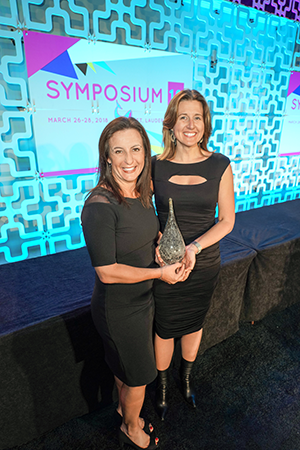Through its learning-led future-oriented strategy, Accenture’s research and experimentation benefits employees, clients and the bottom line.
by Ave Rio
May 24, 2018

In 2017, the talent and learning organization of global management consulting firm Accenture aided the firm in its effort to help clients with the digital transformation of the world through a future-oriented strategy. With more than 425,000 employees in 120 countries and 40 industries, the sheer scale and scope of the learning efforts at the world’s largest independent technology services provider makes the firm stand out. Accenture also won the 2014 LearningElite competition, with 305,000 employees and $30 billion in revenue. In Fiscal Year 2017, the firm had $34.9 billion in revenue.
Accenture Global Learning Lead Allison Horn said the firm’s leadership and culture of learning — “time away to learn and learning all the time” — have been key to that success. She said culture comes to life in how the firm communicates internally, through activities and learning experiences like hackathons and connected classrooms. “This culture is bred from the very top of the organization by a leadership who regularly reminds employees how critical learning is to the success of our business,” Horn said. She said many leaders recognize they became who they are because of the learning experiences and growth opportunities they have had at Accenture. “They then feel a sense of stewardship in helping others grow and develop — they therefore become advocates for learning,” she said.
Accenture’s future-oriented strategy drives forward the firm’s own business and the businesses of its clients. Horn said the business strategy and learning strategy are so intertwined that they think of them as one strategy. She said this “one strategy” mindset encompasses the strategy of the business, the firm’s vision of the future workforce and the learning strategy needed to shape the future. “Our business cannot succeed without a fine-tuned learning machine building the skills and abilities of our people,” she said.
The company is constantly questioning the way it does things and investing in experimentation and research through its talent research and innovation team. For example, to increase learning retention and return on investments, the team is researching brain science — including neuroscience, behavioral psychology and social physics — to understand what makes learning effective. “Our people are constantly learning, and in order to do so, they need to be supported in ways that remove learning barriers and maximize learning retention and application,” Horn said. “The learner and the learning experience are always at the center of what we do.”
With the future-oriented strategy in mind, the firm’s learning professionals are designing flexibility into their approaches to ensure they are constantly evolving with the challenges and demands of the workforce. “Our employees have consumer-level expectations of how they should interact with technology,” Horn said. “They expect Accenture to provide a similar learner experience to that which they see in the open market. We work hard to deliver on that level of expectation.”
Another learning philosophy of the firm is embodied through their Truly Human initiative, which focuses on nurturing people’s “whole self” — their mind, body, heart and soul. The guiding philosophy is that mental resilience is key to bringing one’s best self to work and home. With that in mind, in 2017 Accenture globally introduced the flagship Accenture Mindful Performance program.
Horn said the AMP program includes mindfulness training emphasizing mental effectiveness and mental strategies to improve attention and focus. It is five sessions of 90 minutes each over 12 weeks delivered virtually or on-site. There is also an AMP mobile app with daily training sessions and progress charts. In addition, employees can share their experiences in mindfulness communities and get one-on-one coaching from experts.
Since its implementation, more than 1,000 employees have taken part in the program and there are 20 internal certified facilitators embedding the practice across leadership and HR programs, team events and webcasts. Horn said the program has proven to increase focus, creativity and resilience and reduce stress and distractedness. Further, every single participant of AMP recommends it.
One participant, Jan Emil Kjærgaard Lindhøj, a strategy consultant at Accenture, said the program improved his work-life balance. “I do not mean the number of hours I put into work, but rather the ability to better ‘shut out’ work in my leisure time, enabling me to better spend quality time with my family and friends and recharge my batteries,” he said.
Through their future-oriented strategy in 2017, revenues from digital, cloud and security-related technologies have grown to $18 billion, a 30 percent increase over FY 2016, and accounted for half of the total FY 2017 net revenues. Going forward, the company is continuing research to understand how to equip its people with the skills and competencies necessary for the future in the most efficient way possible.
Read more about the 2018 LearningElite winners.
Ave Rio is an associate editor at Chief Learning Officer. She can be reached at editor@CLOmedia.com.




